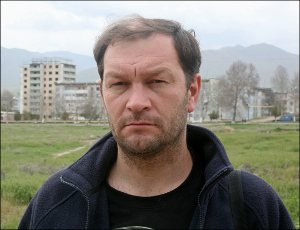Today we start publishing a story by Dmitry Tihonov, a journalist and human rights defender, who was suppressed for documenting forced labour in Uzbekistan. After several fabricated cases and false accusations, his house in Angren, Uzbekistan, was burned in October last year.
How the Government of Uzbekistan Created a Case against me
by Dmitry Tihonov
Throughout 2015 the government of Uzbekistan falsified information and fabricated a narrative about me in order to eliminate another human rights defender from our country. Starting from March 2015, Uzbek state propaganda persistently depicted me as an agent of the West and my human rights work “as a highly paid profession aiming at discrediting Uzbekistan and deteriorating the situation in the country to the level of Maidan in Ukraine.”
In my case, the police, prosecutor general and National Security Service (“SNB”) acted in concert to silence me as an independent citizen and human rights activist. They work to ensure no one is left to testify about the shameful phenomena of our time, such as the forced-labour system that squeezes labour and income out of the Uzbek people for the benefit of the authorities.
Over the past year, I had the misfortune of learning first hand the range of tactics previously deployed by the KGB in the Soviet Union and now by the SNB against dissidents. The SNB worked doggedly to destroy my honest reputation, by defaming me, fabricating information, manipulating public opinion, traditional spying and surveillance of my mail and email, trumping up charges, coercing people to testify against me, and destroying my home and property. Security officials accused me of racism and spying for Western countries.
The SNB escalated its campaign against me to the point of accusing me of “terrorist activities with the aim of undermining the constitutional order in Uzbekistan” pressuring my lawyer to stop representing me.
The security services efforts against me are part of a broader, systematic and methodical effort to exterminate Uzbek civil society and establish control over citizens who want to live in accordance with the law and not based on officials’ arbitrary orders.
The experience has confirmed that they Uzbek government considers human rights solely as a tool of Western countries to exert influence. In its view, the discussion of mass violations of citizens’ rights in Uzbekistan is merely political, an attempt to undermine the state. The Uzbek administration considers all reports of noncompliance with human rights standards and the law as defamation, aimed solely at undermining its order. Any protest or civil disobedience by the public is understood as an attempt to create chaos and public disorder. The Maidan protests in Ukraine increased this anxiety.
Various clichés attempt to soften the perception of its aggressive policy against the freedom of speech and human rights. Officials assert forces of evil “abhor our independence,” to justify their efforts to silence honest people.
In my case, the Uzbek government is trying to portray me as member of a terrorist organization. Until recently, this was their preferred method against religious practitioners, now extended to human rights defenders.
As an investigator told me during one of my detentions, “The law is one thing, but what is real is another.” This criminal investigator briefly and concisely explained the legal realities in our country.
I was detained for my human rights and journalistic work three times in 2015. Each incident included two parts: the official detention and related protocols, and the unofficial interrogation about my human rights work and motivation for doing it.
The police officers generally expressed their understanding. Only one officer beat me, on the face and head with a stack of documents on September 20.






